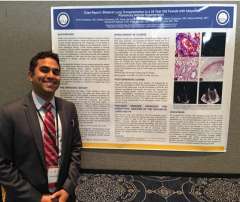Anesthesiology Resident Research Pathway (ARRP)
In this pathway, residents will complete up to 9 months of research during their residency. Residents may apply to enter this track during the Clinical Base Year (CBY or PGY-1) but no later than the first 6 months of the PGY-2 year. All residents admitted to this track will be required to submit to and present their research at our departmental Annual Scientific Evening and the Western Anesthesia Residents Conference (WARC) each year. Abstract submission to regional and national society meetings (ASA, SCA, SPA, ASRA, SOAP, etc.) with departmental support is highly encouraged.

-
CBY or PGY-1: Resident will complete all required rotations according to the standard residency track. With the guidance of the Residency Program leadership, the resident should identify possible research interests and apply for admission to the research track.
- PGY-2 to PGY-3: With the guidance of the Residency Program leadership, the resident should identify research interests and mentors. The resident should have regular meetings with research mentors at least every six weeks. Up to 3 months may be allowed for research in the PGY-2 to PGY-3 year. Residents should submit a formal research project proposal by the middle of the PGY-2 year to the Clinical Research Committee (CRC) for approval. The resident must continue to meet with research mentors at least every six weeks.
- PGY-4: The resident will have up to 6 months of dedicated research time. At this point, the resident should meet with research mentors monthly. It is expected that the resident should have a manuscript in submission or published at the end of the research track. A special commendation will be noted at graduation for all residents who have completed the research pathway.
Residents in the ARRP must demonstrate excellence in clinical skill and medical knowledge, as demonstrated by maintaining good academic standing as per departmental education policy. In addition, the resident must pass all milestones and receive satisfactory evaluations. The resident may be allowed to schedule the Basic Examination on an alternate schedule at the discretion of the Program Director. Residents must take the standard complement of call during their research months.
Application Process
- Residents may apply to the program during the second half of the CBY but no later than the 6-month point of the PGY-2 year.
- Advanced degrees, including Masters and PhD, are desirable but not required.
- A letter of intent with research background, interests, and future career plans must be submitted.
- 1-2 letters of references must be submitted.
- The Chair, Residency Program leadership, and the Clinical Research Committee will review applications and render final decisions.